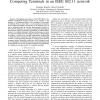Free Online Productivity Tools
i2Speak
i2Symbol
i2OCR
iTex2Img
iWeb2Print
iWeb2Shot
i2Type
iPdf2Split
iPdf2Merge
i2Bopomofo
i2Arabic
i2Style
i2Image
i2PDF
iLatex2Rtf
Sci2ools
INFOCOM
2003
IEEE
2003
IEEE
Kalman Filter Estimation of the Number of Competing Terminals in an IEEE 802.11 network
Abstract— Throughput performance of the IEEE 802.11 Distributed Coordination Function (DCF) is very sensitive to the number n of competing stations. The contribute of this paper is threefold. First, we show that n can be expressed as function of the collision probability encountered on the channel; hence, it can be estimated based on run-time measurements. Second, we show that the estimation of n, based on exponential smoothing of the measured collision probability (specifically, an ARMA filter), results to be a biased estimation, with poor performance in terms of accuracy/tracking trade-offs. Third, we propose a methodology to estimate n, based on an extended Kalman filter coupled with a change detection mechanism. This approach shows both high accuracy as well as prompt reactivity to changes in the network occupancy status. Numerical results show that, although devised in the assumption of saturated terminals, our proposed approach results effective also in non saturated conditi...
Collision Probability | Communications | Distributed Coordination Function | INFOCOM 2003 | Non Saturated Conditions |
| Added | 04 Jul 2010 |
| Updated | 04 Jul 2010 |
| Type | Conference |
| Year | 2003 |
| Where | INFOCOM |
| Authors | Giuseppe Bianchi, Ilenia Tinnirello |
Comments (0)

